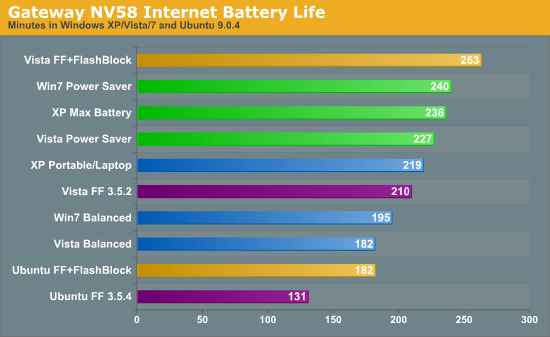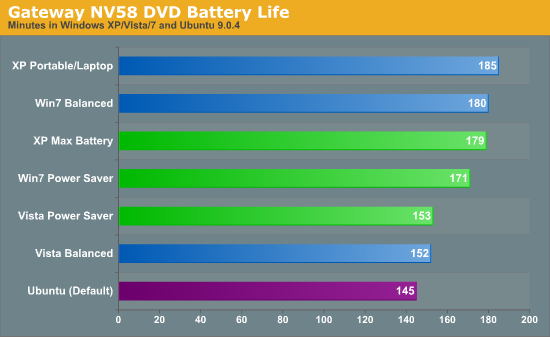Gateway NV58 (Intel) - Battery Life
We first looked at AMD's mobile platform with several operating systems and now it's Intel's turn. Once again, here's the rundown of specifications followed by the results, starting with battery life.
| Gateway NV5807u Test System | |
| Processor | Intel Core 2 Duo T6500 (Dual-core, 2.1GHz, 2MB shared L2, 45nm, 35W, 800MHz FSB) |
| Memory | 2x2048MB Micron PC2-5300 @ DDR2-667 5-5-5-15 (Micron Technologies 16HTF25664HY-667G1) |
| Graphics | Integrated Intel GMA 4500MHD Driver version 15.13.4.64.1829 10 Shaders at 475 MHz |
| Display | 15.6" Glossy WXGA (1366x768) LG LP156WH2-TLE1 |
| Hard Drive | HITACHI Travelstar 5K500.B 320GB 5400RPM 8MB (HTS545032B9A300) |
| Optical Drive | 8x DVDRW (TSST Corp TS-L633B) |
| Battery | 6-Cell 10.8V, 4400mAhr, 47.5Whr |
| Operating System | Windows Vista Home Premium 64-bit |
| Price | NV5814u available online starting at $580 |


If you expected the standings to remain the same regardless of computer hardware, you might be in for a bit of a surprise by the above charts. This time, Windows XP wins in both DVD playback results, providing better battery life using the "Portable" profile than the "Max Battery" profile. Windows 7 also performs slightly better on DVD playback using the Balanced profile, whereas we saw virtually no difference between the power profiles using the NV52.
Why is Balanced beating Power Saver this time? Intel's SpeedStep technology appears to be better than AMD's PowerNow!, though minor differences in drivers may also contribute to the standings. The theory is that letting your CPU run at 100% for a short time and then returning to minimum power draw as fast as possible results in the best battery life, which is why setting the maximum CPU state to 50% isn't always the best idea. Intel CPUs are supposed to switch between C-states faster than AMD CPUs, or so we've heard, and these results seem to support that idea. However, the Internet battery tests again all favor the power saving profiles by a large margin, so power saving profiles can have a positive impact, just not in DVD playback. Ubuntu brings up the rear in both battery life tests once again.
Internet battery life shows different standings on the three Windows operating systems compared to the NV52. Windows 7 is just 2% ahead of XP and 6% ahead of Vista with the power saving profile; switch to the balanced profile and XP jumps into the lead offering 12% more battery life than Windows 7 and 20% more battery life than Vista. Looking at the profiles, Windows XP shows the smallest change by using a power saving profile, improving by 8% when using the Max Battery option. Windows 7 and Vista both improve by around 25% (23% for Windows 7). That means all three Windows OSes did better in Internet battery life with power saving profiles relative to the NV52.
Our testing with Ubuntu once again requires a bit of explanation. First, LCD brightness adjustment did not work properly under Ubuntu (with the drivers we used), with the final setting ending up at 150 nits instead of 100 nits. That means battery life is going to be slightly lower because the LCD is consuming an extra 1-2W. Second, unlike the NV52, we didn't experience any difficulties with DVD playback - hooray! Internet performance using Firefox still feels horribly slow in comparison to Firefox or Internet Explorer on Windows, and while blocking Flash content helps we still prefer Windows.
Enabling FlashBlock with Firefox again has a substantial impact on battery life; Vista improves by 25% - the same as on the NV52 - and Ubuntu improves by 39% - slightly less of an improvement compared to the NV52. The gap between Vista and Ubuntu is still huge, even bigger than on the NV52. Without FlashBlock, Firefox on Vista offers 60% more battery life than Firefox on Ubuntu. Even with FlashBlock, the gap remains at 45%, which is far more than the Power Saver profile offers.
Overall, Windows XP leads in best-case battery life for DVD playback on the Intel platform, providing 3% more battery life than Windows 7 - not a huge difference. The gap between Windows 7 and Vista is much larger, with the best-case Windows 7 result being 18% higher than the Windows Vista scores. Ubuntu almost matches Windows Vista, and it might even match Vista if we could modify the LCD brightness.










106 Comments
View All Comments
JarredWalton - Monday, September 21, 2009 - link
Links please? I'm not a Linux guru by any stretch of the imagination, so if there's a "better" Linux option out there for testing I'm willing to give it a look. Ideally, I need something similar for the AMD platform.prince34 - Monday, September 21, 2009 - link
You could always look a UNR(Ubuntu Netbook Remix) as a netbook distro. It's what I use on mine. I've done some comparisons to XP on it, and it seems to follow the trends you are seeing, but not with as much disparity.http://www.ubuntu.com/GetUbuntu/download-netbook">http://www.ubuntu.com/GetUbuntu/download-netbook
smitty3268 - Monday, September 21, 2009 - link
I'm not sure Moblin is really a "mainstream" linux option at this point, it's more of an Intel "look at what we can do on netbooks" research project. It does supposedly have 5 second boot times. I suspect your tests here are almost completely dependent on the browser and Flash anyway, and the video drivers. All areas that Linux does not excel at - battery and performance testing of Linux + Apache or file serving would no doubt be much better.http://moblin.org/downloads">http://moblin.org/downloads, if you really want to try it.
smitty3268 - Monday, September 21, 2009 - link
Or the LiveCD version: http://moblin.org/documentation/test-drive-moblin">http://moblin.org/documentation/test-drive-moblinsmitty3268 - Monday, September 21, 2009 - link
Firefox for Linux is well known to be terribly slow and unoptimized compared to the Windows version. It would be interesting to see the battery results from running the Windows version through WINE on Ubuntu, just to see how that compares - I know it blows the Linux native version away as far as javascript performance is concerned, and I'm sure Flash is the same. You could also try Chrome, since I've heard it works quite fast, even though it's still in beta.Chlorus - Monday, September 21, 2009 - link
But how could that happen? I thought Linux was the most awesome OS ever? All the people on slashdot said so! Are you saying they lied? M$ SHILL!!!smitty3268 - Tuesday, September 22, 2009 - link
If you read what I was saying, it doesn't have anything to do with linux, it's a Firefox problem. They've got performance bug reports that say, "fixed, for windows. we could do this for linux but not worth the effort." They don't even enable profiled compilation, which is good for a 10-15% boost on windows.smitty3268 - Monday, September 21, 2009 - link
Also, Ubuntu 9.04 (and other distros released last spring) had a terrible, terrible regression with Intel video driver performance. I'm not sure how much that really affects battery life, but it definitely could. Something to keep in mind, anyway, as you compare the differences between the two laptops.andrewaggb - Tuesday, September 22, 2009 - link
It's true about the intel driver, but let's be honest, if it wasn't the graphics driver it'd be pulse audio, or using 64 bit instead of 32 bit firefox, ext4 whatever... Seems linux get's alot of excuses for it's problems.I'm pretty tired of ubuntu and fedora. Releasing half-finished, barely tested, OS's to the masses is not doing linux a favour, but as the answer to everything is it's fixed in svn... you're kinda stuck.
JarredWalton - Monday, September 21, 2009 - link
I followed a guide on fixing Intel GPU performance in Ubuntu... I don't know if it really worked or not, but here's the reference:http://ubuntuforums.org/showthread.php?t=1130582">Jaunty with Intel Performance Guide. I stayed with the default kernel and the "Safe" configuration, which may be partly to blame for suboptimal results. Then again, the ATI platform fared worse under Jaunty.